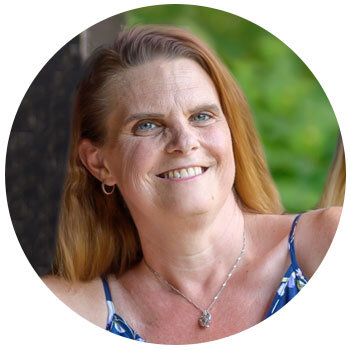MEET KIMBERLY
Choosing to live a healthier life requires some sacrifices. For Kimberly Cox, the sacrifices are easy to name: not sleeping in, not popping the tab on a can of Mountain Dew.
Kimberly answers an alarm blaring at 6 am to rise and sweat through a workout. She shuns caffeine. She sticks to a low-carb diet. And two years after treatment for ER-positive breast cancer, Kim has shed her goal of 100 pounds.
Change isn’t easy, but "if I have fought this hard to stay alive," said Kim, 48, "then there are going to have to be changes."
Most people enjoy the benefits of physical fitness simply by maintaining a healthy lifestyle. Breast cancer survivors need to work a little harder. Research shows women don't automatically regain stamina after beating their disease. It's a point Tarah J. Ballinger, MD, stresses with her patients and one that's a focal point of her research.
Recently, Dr. Ballinger wrapped up a clinical trial exploring how to help women become more active after cancer treatment. The mechanics were straightforward. Women were outfitted with GPS-enabled watches and given personalized regimens to do at home. Meanwhile, Ballinger and her research team tracked their movements and compared the results to baseline data.
The fitness routine “made a big difference," to those who were able to maintain or improve their strength and stamina, said Ballinger, an oncologist and member of the Vera Bradley Foundation Center for Breast Cancer Research. Ballinger’s goal is to use the program as a catalyst for new, healthier lifestyles. "We can use that as sort of a springboard to get patients into more intensive exercise."
Diagnosed in April 2017, Kim would have struggled to make exercise a part of her treatment. At the time, she knew she was overweight, but she was happy with who she was. And before getting breast cancer, "the worst 45th birthday present ever," checkups showed she was mostly healthy.
Like many women, Kim’s treatment exacted a toll. Weekly infusions of chemotherapy left her "aching from the top of my head to the tips of my toes," she said. The recovery from a double mastectomy also proved grueling: the three-month span included a staph infection and sutures ripping loose. But when it was over, she was declared cancer-free in spring 2018.
It was her gynecologist who laid out how obese women have higher rates of cancer recurrence. She referred Kim to a specialist in Bloomington who helped her tailor a diet and weight loss goals.
Early workouts were modest—an untimed mile stroll through her neighborhood. Later, Kim adopted a half-hour walking routine which soon grew stale. So, she went hunting online for a change of pace, and discovered a 30-minute weight-based workout.
“There have been days where it takes everything I have to exercise. But now it’s more about proving that I’m strong enough to do it, proving to myself that this is the time that I’m not going to quit.”
She also thinks about the hope she can give others by pushing through.
Her role as finance director at TeenWorks, Inc., a non-profit in Indianapolis, gives her fulfillment. Now that her life exemplifies perseverance and empowerment, she hopes the young teens who are carving out their own futures will see and emulate these attributes in their own lives.
And, even though she has a daughter in college, "we aren’t empty-nesters," Kim says. She and her husband are also raising her 4-year-old great-niece, whom they have adopted. “I want to be here for my girls, to make sure that I'm alive to see them into their adulthood, and to be healthy for them. I preach to them to take care of themselves and don't ever lose yourself in everyday life."


